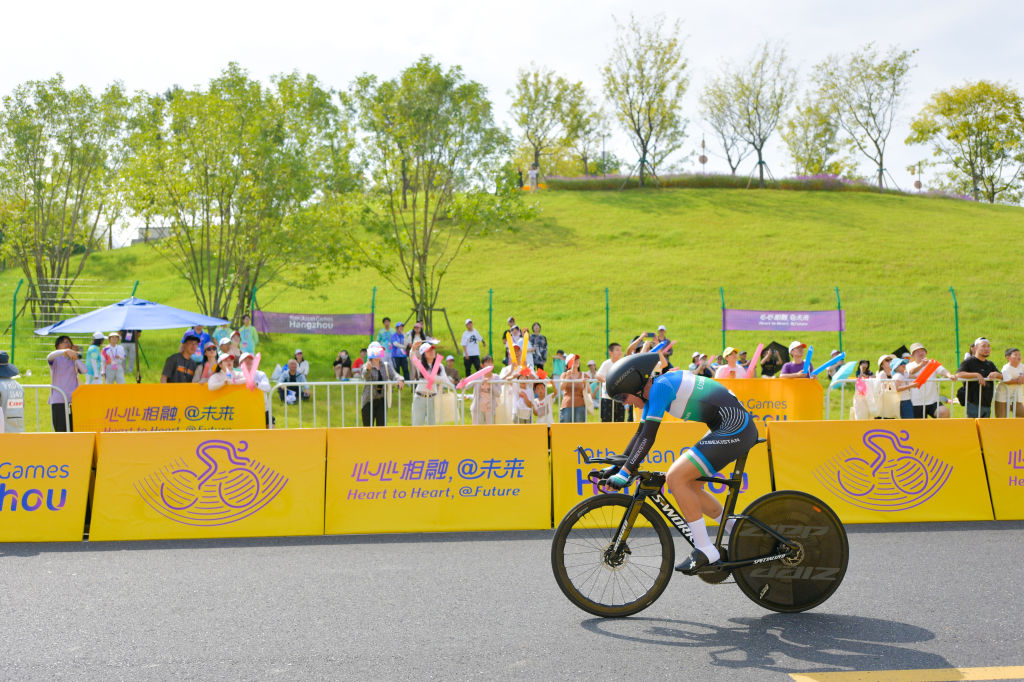
When the Tour de France Femmes avec Zwift rolls out of Rotterdam on August 12, 2024, there could be a few surprising names in the peloton.
A UCI Women’s squad from Uzbekistan, Tashkent City Women’s Pro Cycling Team, currently looks set to be invited to all Women’s WorldTour races in 2024 after finishing 19th in the UCI World Ranking of teams at the end of 2023.
The merger between Liv Racing TeqFind and Jayco-AlUla (to be renamed Liv-AlUla-Jayco in 2024) and the folding of EF Education-TIBCO-SVB has effectively pushed the Uzbek team up to 17th and into the third of the three wildcard spots normally reserved for the top three Continental teams in the world ranking.
Tashkent’s road to racing in the Women’s WorldTour in 2024 has not been a straightforward one and it has not yet been confirmed – several rival teams have lobbied with the UCI over the validity of some of their points-scoring results since the summer.
The wildcard allocations are yet to be made official for the 2024 season, with the UCI having told Cyclingnews that the “registration procedure is currently ongoing and a list of all obligatory invitations for the 2024 UCI WorldTour events shall be published on the UCI website at a later date” – thought to be the December 12.
Tashkent planning a limited WorldTour schedule
Tashkent geared their entire 2023 season around winning as many UCI points as possible, with the intent to earn Uzbekistan a spot in the 2024 Olympic Games road race, which they achieved comfortably.
The team, backed by the Uzbekistan government, expects the wildcard to be confirmed by the UCI. However, they are only planning to race a few WorldTour events in 2024 due to budgetary constraints, team size and a lack of cycling infrastructure.
“The finance from the government is just for Olympic medals, not for the Tour de France or Giro d’Italia,” the team’s coach, Gleb Groysman, told Cyclingnews.
“We cannot race all WorldTour races because we don't have enough riders. We have maybe three or four girls ready to race in the WorldTour, and they are very young.
“We have a very, very hard situation because there are not enough bikes, wheels, anything…staff is problem number one. There are no professional staff there.”
It’s symptomatic of a nation that has risen through the cycling ranks at a sensational pace since Groysman took the reins as coach of the women’s national programme in 2021.
The team are hoping for additional financial support from the government or for a sponsor to come on board so that they can fulfil their race schedule for next season. Groysman wants to raise an additional $500,000 in budget.
Tashkent plan to race the Tour de France Femmes avec Zwift, Giro d’Italia Women and a few other WorldTour stage races such as the UAE Tour, but Groysman is not planning to take the team to any of the one-day classics in the spring, apart from a possible ride at Strade Bianche in March.
Most of the major one-day races in the spring clash with the international track programme, which is a greater priority due to Uzbekistan’s Olympic ambitions in the velodrome.
Central Asia’s first team to race the Tour de France Femmes avec Zwift

Uzbekistan is a nation with some history in cycling, in particular the exploits of the enigmatic Djamolidine Abdoujaparov, one of the most successful sprinters of the 1990s, and recent WorldTour professional Sergey Lagutin.
However, Groysman, who coached a teenage Pavel Sivakov in his native Russia but is now living in the USA, described the Central Asian country as “not a cycling country, absolutely not.”
As the name suggests, Tashkent City Women’s Pro Cycling Team is based in Tashkent, the capital of Uzbekistan. It solely features Uzbek riders, the most well-known of these being Olga Zabelinskaya.
Before joining her current team, the 43-year-old Zabelinskaya had been part of European and American-based UCI teams since 2004, most recently racing for Roland Cogeas Edelweiss Squad in 2022.
Zabelinskaya has three Olympic medals to her name, having taken silver in the individual time trial in 2016 and two bronzes in 2012, all when representing Russia. She was also 7th at October’s Tour of Chongming Island Women’s World Tour race.
The team also features several promising young talents, such as Margarita Misyurina and Yanina Kuskova, the latter particularly impressed this season when she finished second at the Italian stage race Trofeo Ponente in Rosa, just behind Jolanda Neff.
“I cannot say to you our results for next year, but I'm sure we can reach our goals in the top of the races because they are very, very motivated. All the girls are very, very motivated and ready to work. I don't have any problem with working, they really work, 24/7. So, I hope we can be top of the races next year,” Groysman said.
“We cannot win the Tour de France or Giro d’Italia. A good result for us in the first year would be to finish there with all our riders. Maybe on one stage a top-three, maybe. We cannot win right now, but if we can finish, it would be great for our first season racing in the WorldTour.”
European teams raise points query with UCI
A brief foray into the late-season Chinese WorldTour races aside, Tashkent raced a low-profile calendar in 2023. They secured UCI points in smaller one-day races, continental championships and national championships.
The compilation of points helped them to surprisingly shoot up the UCI team rankings early in the season, above established European UCI Women’s teams such as Cofidis and St Michel-Mavic-Auber 93 - bumping the latter out of the wildcard places.
As the season wore on, St Michel-Mavic-Auber 93 became suspicious of Tashkent’s points haul. In the summer, the French team raised a query with the UCI alongside several others.
“As we had the 2024 wildcard as the main goal for our 2023 season, we always had an eye on the UCI World Ranking,” St Michel-Mavic-Auber 93 Head of Communications and Development, Charlie Nerzic, told Cyclingnews.
“Mid-season, we started to see that Tashkent was getting many points on races that did not match UCI minimum requirement regarding participants or with both the national team with Tashkent riders and Tashkent racing.”
UCI rules state that road races must have a minimum of 40 riders to award UCI points. Tashkent had scored points in several races in Cyprus in February, which did not meet this standard.
In a series of one-day races at home in Uzbekistan in May and at the Belgrade GP Woman Tour the month later, Tashkent fielded riders representing the Uzbekistan National Team as well as their own team. In theory, this would allow Tashkent to score points with double the number of riders at each race.
Groysman said that the team simply “didn’t know” that this was against the rules. “We were in Europe with eight riders, so we asked the organisation in Belgrade, could we put in two teams, four and four? And they said, 'yes, you can,'” Groysman added in defence.
In October, the UCI removed points from most of the races in Uzbekistan and Cyprus. The team were also retrospectively disqualified from the 2.2 Belgrade GP Woman Tour.
“The UCI published a new UCI World Ranking, and most of the problematic points were deleted,” Nerzic said.
However, Nerzic had also raised a concern with the UCI about Uzbekistan’s national championships.
Tashkent had gained a significant number of points by starting riders who were eligible in both the under-23 and elite races, filling the top 10 in almost every event.
This is legal within the UCI’s rules and a “nice way to cash 700 points,” according to Nerzic. However, this practice is only permitted if the under-23 and elite championships are contested over separate races, which is something St Michel “doubted.”
Groysman affirmed the results, stating that the under-23 and elite races took place on separate weekends and even had a UCI commissaire present. He also pointed out that this is a common practice in other countries too.
Tashkent’s 709 points gained at the national championships stand and form more than a third of their 2023 total.
With the UCI process now complete, to Nerzic’s knowledge, Tashkent should earn its wildcard according to UCI rules. As the rankings stand at the time of writing, Tashkent sits 203 points ahead of St Michel after point deductions.
“Facts are now that we won't get awarded the mandatory wildcard for 2024. It is what it is. We simply hope that races organisers will see our value and invite us,” Nerzic said.
Tashkent’s wildcard success could be viewed as a positive for the UCI’s agenda to globalise the sport. It shows that wherever a team is based, they can access the world’s biggest races if they score enough points. However, the manner in which Tashkent scored their points and unknown ability of many of their riders, may leave others questioning the process which delivered the Uzbek squad a place at the top table of cycling.







